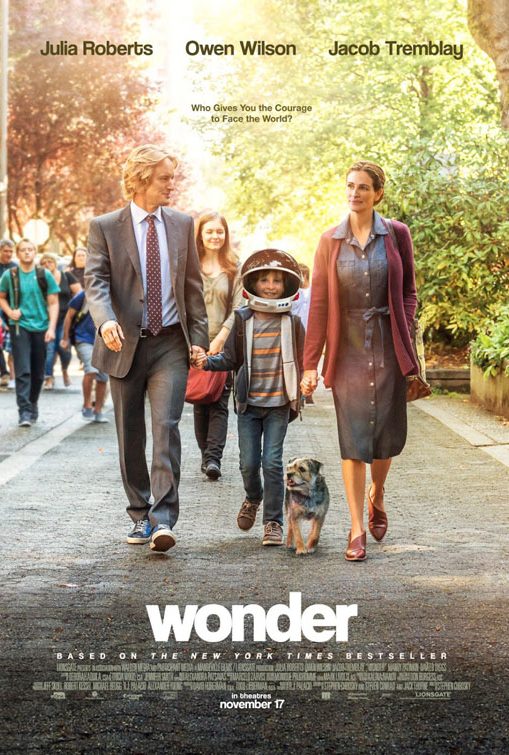“Auggie Pullman (Jacob Tremblay; Burn Your Maps, Room), the central character in Stephen Chbosky’s Wonder, is a brainy 10-year-old boy with a sweet high voice and a congenital facial deformity, whom numerous corrective surgeries have left looking like a cherub after a car accident. His left eye tugs downward as if a teardrop were falling from it; his ears are bulbs of flesh, and his face is framed by a pinkish ring of scar tissue. That said, he’s not the Phantom of the Opera. He’s just an ordinary kid whose looks take a bit of getting used to.
Auggie has been home-schooled by his mother, Isabel (Julia Roberts), in their cozy Brooklyn brownstone. But now that he’s 10, she and Auggie’s dad, Nate (Owen Wilson; The Grand Budapest Hotel, Midnight in Paris), have made the decision to send him to middle school. They know they can’t shield him from the world forever, and they have no desire to.
Roberts and Wilson make a compelling team; they play the Pullmans as supremely sensitive, loving parents who have the occasional tug-of-war spat about what’s best for their special son. Yet both want him to stand up for himself, and to be part of a community. Auggie wants that, too, though the kids he meets at Beecher Prep School don’t make it easy. By the end of his first day there, he has already been nicknamed (after one of his favorite Star Wars characters) ‘Barf Hideous,’ and he chops off the rat-tail braid that’s his only fashion statement—a testament to the destructive power of peer pressure. Just enough of the kids treat Auggie like a freak to make the belief that he is one tough for him to shake.
Movies about people with dramatic disfigurements run a high risk of being mawkish and manipulative. Yet maybe because the dangers of grotesque sentimentality loom so large, a handful of filmmakers, over the years, have made a point of taking on stories like this one and treading carefully around the pitfalls. David Lynch did it in The Elephant Man, his shrewdly restrained, underbelly-of-London Gothic horror weeper, which revealed John Merrick, beneath his warped and bubbled flesh, to be a figure of entrancing delicacy. Peter Bogdanovich did it in Mask, his straight-up tale of a teenager with a face of scowling strangeness who came to embrace the person he was.
Wonder, adapted from R.J. Palacio’s 2012 novel, is a movie that belongs in their company. It’s a very tasteful heart-tugger—a drama of disarmingly level-headed empathy that glides along with wit, assurance, and grace, and has something touching and resonant to say about the current climate of American bullying. At the same time, the film never upsets the apple cart of conventionality. Wonder is an honest feel-good movie, but it lacks the pricklier edges of art.” (Owen Gleiberman, Variety)
“Much of the film’s success does reside upon Chbosky’s mostly restrained execution, but it is Tremblay that carries it. His fully rendered and exceptional performance is something of a miracle as it joyously goes past the prosthetics and into the core of his character’s roller coaster of emotions.” (Jordan Ruimy, The Film Stage)
“Giving the film credit where it’s due, Wonder never cheats in its pursuit of emotion. It’s never mawkish of manipulative, and its characters are so well-established both in the writing and in the performances that the movie ultimately does the hard work of earning those damp Kleenexes.” (Alonso Duralde, The Wrap)
